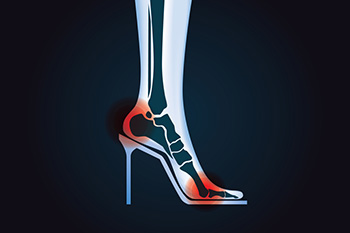1648 US Highway 130
North Brunswick, NJ 08902

Fashion trends often dictate footwear choices, but some styles can take a toll on foot health, particularly for women. High heels, revered for their elegance and sophistication, are notorious culprits in causing a myriad of foot problems. The elevated heel places excessive pressure on the forefoot, leading to issues like bunions, hammertoes, and neuromas. Moreover, prolonged wear of high heels can shorten the Achilles tendon, contributing to calf tightness and discomfort. The narrow toe box squeezes toes together, increasing the risk of ingrown toenails and corns. Additionally, high heels alter the body's natural alignment, leading to lower back pain and postural imbalances. Despite their allure, high heels can wreak havoc on foot anatomy and function. Opting for footwear with lower heels and adequate arch support can help reduce these risks while still maintaining style. Wearing high heels may cause foot pain, and there are a variety of foot conditions that can develop. If this applies to you, it is suggested that you schedule an appointment with a podiatrist who can treat foot ailments from high heel use.
High heels have a history of causing foot and ankle problems. If you have any concerns about your feet or ankles, contact Dr. Robert Fink from Brunswick Foot & Ankle Group. Our doctor can provide the care you need to keep you pain-free and on your feet.
Effects of High Heels on the Feet
High heels are popular shoes among women because of their many styles and societal appeal. Despite this, high heels can still cause many health problems if worn too frequently.
Which Parts of My Body Will Be Affected by High Heels?
What Kinds of Foot Problems Can Develop from Wearing High Heels?
How Can I Still Wear High Heels and Maintain Foot Health?
If you want to wear high heeled shoes, make sure that you are not wearing them every day, as this will help prevent long term physical problems. Try wearing thicker heels as opposed to stilettos to distribute weight more evenly across the feet. Always make sure you are wearing the proper shoes for the right occasion, such as sneakers for exercising. If you walk to work, try carrying your heels with you and changing into them once you arrive at work. Adding inserts to your heels can help cushion your feet and absorb shock. Full foot inserts or metatarsal pads are available.
If you have any questions please feel free to contact our office located in North Brunswick, NJ . We offer the newest diagnostic and treatment technologies for all your foot and ankle needs.